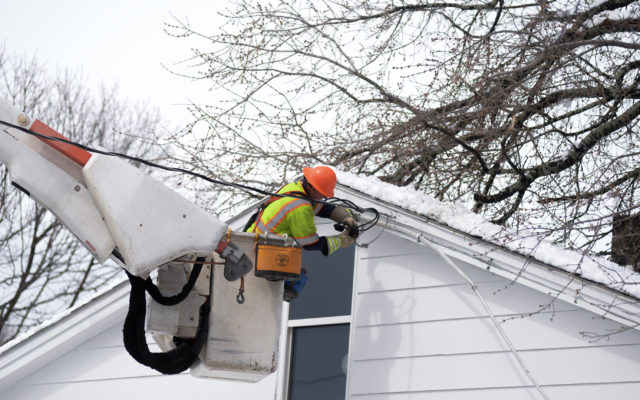
Outages still exceed 60K after spring nor’easter strikes Maine
More than 60,000 people across Maine are still waiting for their power to be restored as of Sunday morning after a nor’easter tore through the state late last week causing widespread outages.
Outages affected more than 260,000 people initially, but that number had come down over the weekend to about 60,200 by 11 a.m. Sunday. Emera Maine reported that 15,755 of its customers were still without power. Central Maine Power Co. was reporting that 44,436 of its customers were still without power.
Central Maine Power Co. said Saturday that it expects power will be restored to most customers by Sunday night. Emera Maine said Sunday morning that it expects 90 percent of its customers to have power restored by Sunday night.
The power outages compounded the frustration Mainers have been facing from having to stay at home to quell the spread of COVID-19.
“It is frustrating to be asked to meet new and seemingly never-ending challenges with courage, patience and compassion,” Gov. Janet Mills said at a press conference Friday. “Everyone is wondering how this will all last. It’s okay to be tired and frustrated.”
As of Sunday morning, 421 people were still without power in Bangor, according to Emera Maine, with power expected to return by Monday at 10 p.m.. Across Penobscot County there are still 10,015 outages. The company said 90 percent of customers should have power back by the end of the day.
In Central Maine Power Co.’s region, Waldo County was hit hardest by the outages. As of Sunday morning, over 9,000 people were still without power across the county. Somerset and Penobscot counties also had close to 10,000 outages on Sunday morning. Central Maine Power has begun to shift additional crews to Penobscot and Waldo counties.
With wind and rain forecasted for Monday, Central Maine Power said in a news release Sunday that crews are remaining vigilant in their power restoration efforts.
Enduring prolonged power outages isn’t a new experience for many Mainers. The ice storm of 1998 shut down schools for weeks, left thousands without power or heat and killed six people. In October 2017, a windstorm knocked out power to half of the state, leaving some in the dark for a week.
Among those without power after the late week storm was Bangor City Councilor Gretchen Schaefer, who said she and her family have endured several prolonged power outages in the Queen City in past years. The difference this time is that there is no escape from the most recent outage.
“All of our usual coping strategies are just not possible right now,” Schaefer said. “Not having anywhere to go is hard.”
Schaefer, who resides on the west side of Bangor, lost power around 1 a.m. on Friday. Saturday morning, a friend who had their power restored loaned Schaefer’s household a generator, which is powering the refrigerator, the internet and small appliances.
But in the 24 hours without power, Schaefer said her family drove around more than they had in all of last month in an effort to charge phones and wireless devices using the car’s USB ports.
While the power was out she also worried about the fate of her freezer, which had just been stocked with items from her first big shopping trip since Maine’s stay-at-home order was put in place. Luckily, thanks to being stringent on keeping the freezer door closed, her food stayed frozen until the generator was hooked up yesterday.
“I could afford to replace it [if I had to] and I recognize my privilege in that, but it was this technical mission to go to the store and get the food and [when the power went out] I thought, ‘Ugh, I have to do that all over again,” Schaefer said.
Typically during a power outage her family would go out to dinner, but takeout was the only option and the wait times for getting pizza in Bangor on Friday night were over an hour-and-a-half. So after picking up dinner, her family ate pizza around 8:30 p.m. by the light of headlamps.
Schaefer said the power outage caused her to “hit a wall.”
“I’m usually the one who is kind of positive, saying ‘oh this is temporary we’re going to get through this,’” Schaefer said. “[Friday] I was just done.”